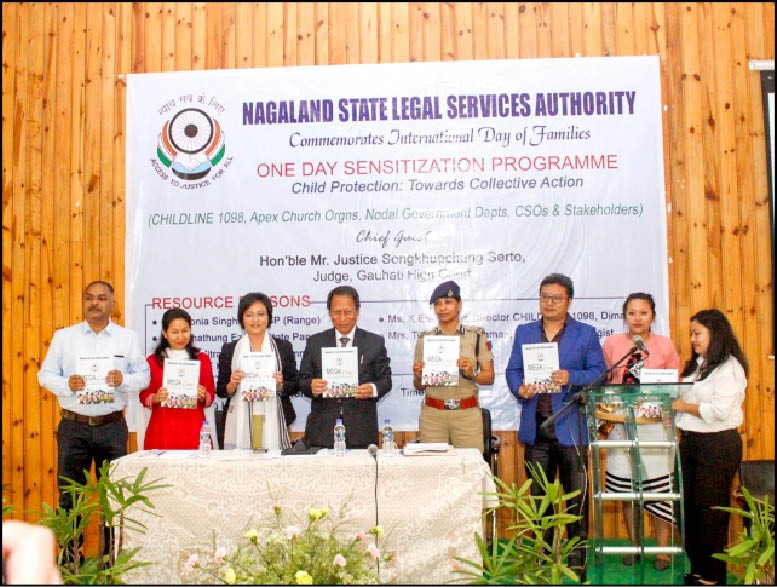Gauhati High Court Judge Justice Songkhupchung Serto, NSLSA Member Secretary Mezivolu T Therieh, NJS and resource persons releasing the Mega Legal Camps magazine. (Morung Photo)

Morung Express News
Kohima | May 15
Nagaland State Legal Services Authorities (NSLSA) on the International Day of Families held a one-day programme on ‘Child Protection: Towards Collective Action’ with the CHILDLINE 1098, Apex Church Organizations, nodal government departments, civil society organizations and stakeholders at the NBCC, Platinum Conference Hall, Kohima on May 15.
Gauhati High Court Judge Justice Songkhupchung Serto in his inaugural speech said that the population of children which comprises a huge section of the society is also the most vulnerable section whose upbringing and wellbeing also impacts our future.
Sharing his personal experiences of looking after 21 children in his lifetime, he said that providing them their needs, paying for education and enabling them live a deserving life has been a magnificent conviction to him.
Apart from stating that there have been enormous laws on the rights and entitlement of children, he called the participants to think and deliberate issues on serious implementations and interventions.
NSLSA Member Secretary Mezivolu T Therieh, NJS while delivering the keynote address called for prevention through continuous intervention at the community level through the active involvement of not only the stakeholders but churches and NGOs among others.
The member secretary said pointed that development of the society can be achieved by the development of the children.
Resource person Limhathung Ezung State Panel Lawyer spoke on ‘laws relating to children issues.’ He pointed that acts such as the Prohibition of Child Marriage Act, 2006 are non-bailable and added that Juvenile Justice (Care and Protection of Children) Act, 2015 is a means to help young violators of law to get back in the society on the right path and ensure aftercare and reintegration of such children.
Towards this, he pointed that children are placed in two categories- those children in ‘conflict with the law’ are handled by State Governments/ ‘Juvenile Justice Boards’ while those in need of ‘care and protection’ are to be looked after by State Governments/ ‘Child Welfare Committees’.
Sonia Singh IPS, IGP (Range) spoke on role played by the Police and its challenges. In the case pertaining to the state of Nagaland, she observed that 80% of the crime committed against children is by family persons. The police officer said that children in Nagaland categorized under the age group between 0-18 comprise 39% of the state population.
Towards this, she said one of the greatest challenges on the way of the administration prevalent on our society is our ignorance towards filing immediate FIR or evidence not disclosed on the part of the person responsible is a major cause of losing medical evidence.
She also mentioned on missing photos of victims or lack of medical facilities in remote areas as huge concern. Singh then said that nodal officers in all departments need to be earmarked for easy accessibility of timely actions.
Avik Mitra, Sr Programme Coordinator, CHILDLINE India Foundation presented videos on coordination mechanism of strengthening issues available for child rights.
K Ela, collab Director, CHILDLINE sharing her experiences on child issues said that not only children but people who fight for their justices also go through the same trauma of the kid and pointed that statistics only poses a bleak picture against unreported cases in the state.
She reflected on issuing of random birth certificates/ permanent residence and later disowning children which also raises a question of illegal adoption. On issues of molestation or rape cases settled at the customary courts, she called for settling it at the best interest of the child keeping in mind that proper help and care is given thereafter.
Themmungla Raman, Clinical Psychologist and founder The Could Room spoke on importance of counseling for parents and children noted that we often tend to compare children to that of our childhood, calling for change of mindset keeping in mind the change of times.
In her practice of giving therapy sessions to children, she pointed that many children undergo mental health issues at a young age or perform poorly in academics because of substance abuse parents, parents with marital hostility or of broken homes or parents or elders who are very resistant to change or correct themselves. To this end, she said that efforts on the part of parents, having close relationship and giving more love and care to their children also develops positive and healthy growth of children.
Carrying the way forward, the member secretary said that awareness and sensitization using creative mediums at village to state level and inclusion of child protection awareness in Sunday school curriculum in all churches can be mechanized.
Creating a state resource directory for the sole purpose of networking and building linkages between competent authorities and the public was also recommended.
Meanwhile, sensitization on the do’s and don’t’s about children issues and importance of seeking mental health awareness was called upon as a need of the hour.
A magazine on 'Mega Legal Services Camp' held across all the districts was also released.
The programme was moderated by Vitono Gugu Haralu, Founder & Director Pathfinders Trust Nagaland and state PLV and chaired by Cherry Ovung, Project Coordinator, NSLSA.


